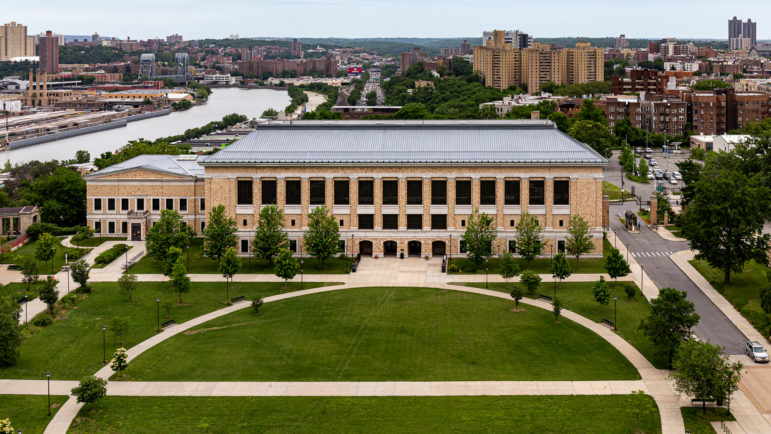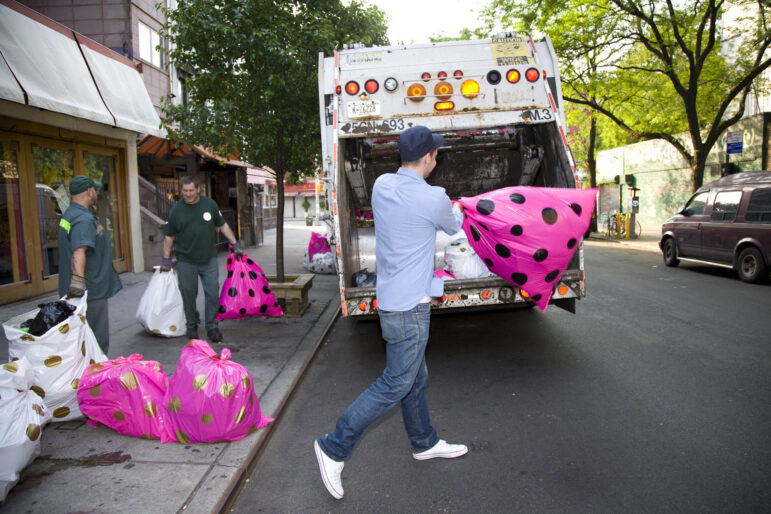A 2019 survey of CUNY undergraduates found that 14 percent had been homeless over the previous year—including 18 percent of community college students—while 55 percent said they experienced housing insecurity.

Adi Talwar
The Bronx Community College campus. A 2019 survey found that 18 percent of CUNY community college students had been homeless during the previous year.A homelessness crisis among students in New York City’s public college system has fueled an effort to provide subsidized, supportive accommodations to undergrads in need.
Neighborhood Coalition for Shelter, an organization that operates supportive housing for young people transitioning out of foster care, hopes to replicate that model for potentially thousands of City University of New York (CUNY) students who experience homelessness. A 2019 survey of CUNY undergraduates found that 14 percent had been homeless over the previous year—including 18 percent of community college students—while 55 percent said they experienced housing insecurity.
Neighborhood Coalition for Shelter Chief Executive Officer Ann Shalof said the financial situation for CUNY students—many of whom are low-income New Yorkers, immigrants and first-generation college students—has only worsened as a result of the COVID-19 pandemic.
“Imagine trying to take remote college courses in a shelter,” Shalof said, adding that an untold number of other students stay doubled up with friends or acquaintances, sleep in cars or even bed down in public places. “If we give them a stable roof over their heads they’ll be able to focus on their studies.”
Shalof and CUNY officials say the housing proposal is still in its early stages, but a pilot program would likely focus on students attending schools in the Bronx. Shalof said her organization has received funding for planning a 20- to 50-person pilot from Trinity Church Wall Street Philanthropies and the organization Graduate NYC. Shalof and nonprofit developers say they have considered starting the program in a hotel converted to residential use. There is not yet a specific timeline for when the new housing would open, but a proposal shared by Neighborhood Coalition for Shelter says it could be as early as the Spring 2022 semester. To qualify, residents would have to demonstrate that they have experienced homelessness and that they are pursuing a degree at a CUNY school, Shalof said.
She envisions fully subsidized, year-round housing for CUNY students who experience homelessness, with on-site education, case management and counseling services. After earning their degrees, students would have some time to remain in their apartments as they pursued job opportunities and new homes.
“We want to target a population of individuals who, with some critical support right now, can move beyond being homeless,” Shalof said. “That’s really who this would focus on … but there is no roadmap for this.”
In a statement, a CUNY spokesperson said the school system welcomed the “timely, important initiative to provide supportive housing to CUNY students who have struggled with homelessness.”
“The program will enable our housing-insecure students to finish their education, achieve self-sufficiency and join the countless graduates that CUNY has helped propel into the middle class and beyond,” the spokesperson added.
CUNY already provides some community college students with financial and educational support through the Accelerated Study in Associate Programs (ASAP). About 53 percent of ASAP students earn their degrees in three years or less, CUNY says.
But many students continue to face hardships that force them out of school, according to a June report by the Center for an Urban Future (CUF), which highlights the financial pressures experienced by thousands of CUNY students, particularly in the system’s seven community colleges.
More than 70 percent of CUNY community college students come from households earning less than $30,000 a year, the report states. And many drop out without a degree after struggling to balance school, work and the cost of living.
“While some community college students in the city do struggle with tuition, far more are getting tripped up by an array of other financial challenges,” the report states, citing the experiences of a Borough of Manhattan Community College student who slept on a professor’s floor and a Bronx Community College (BCC) student who stayed in a homeless shelter after he and his grandmother were evicted.
“I can’t go to school, I can’t do it, my life is not stable, I don’t think I can go to school and do good with unstable housing,” the BCC student, identified as Jordan in the report, recalled telling a counselor.
CUF Executive Director Jonathan Bowles told City Limits that affordable housing is crucial for ensuring CUNY students earn their diplomas, fulfilling the school’s long-standing reputation as a gateway to the middle class.
“It was so clear for us that housing instability and housing insecurity are such a barrier to college completion,” Bowles said. “If we as a city want more low-income New Yorkers to advance into the middle class, earn a college credential and get ahead in this society then addressing housing insecurity is a key step.”
While he was not familiar with the Neighborhood Coalition for Shelter proposal, Bowles pointed to similar examples of successful student-focused homes initiatives, like a Los Angeles-based organization that links local community college students with subsidized housing. More than 80 percent of students who found housing through the program, known as Jovenes, remained in school, the report states.
The CUNY housing proposal also has the support of one influential local lawmaker: Manhattan Borough President Gale Brewer, who last month won a primary to reclaim her old seat in the City Council.
Brewer, a Hunter College instructor, described the proposal during a forum hosted by the A. Philip Randolph Square Alliance last month. She later told City Limits she hopes the proposal could qualify for state funding through a program intended to turn unused hotels into affordable housing for homeless New Yorkers.
State lawmakers passed the Housing Our Neighbors with Dignity Act (HONDA) in June, though it is not clear whether money unlocked through that legislation could go toward time-bound housing for homeless CUNY students.
Even without HONDA money, Brewer said, the supportive housing proposal would go a long way toward helping low-income CUNY students earn their degrees.
“There are so many pluses,” Brewer said. “This would come with services and support. It’s not just a dorm.”










